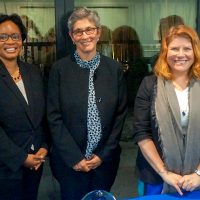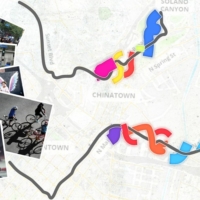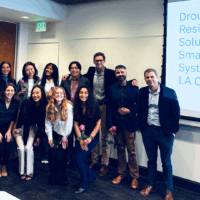Veronica Terriquez Named Director of UCLA’s Chicano Studies Research Center Alumna will hold appointments in Urban Planning and the department of Chicana and Chicano and Central American Studies
Veronica Terriquez, a scholar who has always prioritized community engagement, has been appointed director of UCLA’s Chicano Studies Research Center, home to one of the most robust archives of Latino and Chicano materials in the country. The center, part of UCLA’s Institute of American Cultures, supports intersectional research, programming and advocacy related to Chicano, Latino and Indigenous communities.
Terriquez will become the 10th director in the center’s 51-year history and its first female leader.
“I’m thrilled to be able to direct a center whose mission is to leverage original research on U.S. Latinx communities in order to have an impact on the campus, higher education and the broader society,” Terriquez said. “I’m honored to assume the role of director, following Chon Noriega, whose visionary leadership has broadened the scope of the center’s scholarly and public impact, particularly in the arts.”
Terriquez joins UCLA from UC Santa Cruz, where she was an associate professor of sociology. She received her doctorate in sociology from UCLA, a master’s in education from UC Berkeley, and her bachelor’s in sociology from Harvard University. Her research focuses on efforts to civically engage youth, immigrants and other low-income residents of color. She has published widely in journals and disseminated research in collaboration with schools, unions, community organizers and local governments.
“Veronica’s profile as a scholar with a longstanding commitment to community-based and policy-relevant research aligns perfectly with the mission of the Chicano Studies Research Center,” said David Yoo, vice provost of the Institute of American Cultures. “I am grateful for the visionary leadership that she will bring to the CSRC and to the collective work across the ethnic studies centers.”
Terriquez’s dual faculty appointment as a professor in UCLA’s Luskin School of Public Affairs and in the UCLA College will allow for a broad campus network.
“Veronica will bring a valuable collaborative research practice and perspective to UCLA’s Luskin School, where we know she will find like-minded colleagues who are also dedicated to advancing a more equitable and inclusive California,” said Chris Tilly, chair of Urban Planning.
Terriquez’s research is geared toward policy relevance. She has received major grants from the Irvine Foundation, the California Endowment, and the Bill & Melinda Gates Foundation, as well as fellowships from the Ford Foundation and the Stanford Center for the Advanced Study in the Behavioral Sciences.
“Looking ahead, I see dynamic points at which the CSRC’s historic achievements could be used to spearhead new collaborative efforts that respond to contemporary political, economic, environmental and social crises impacting Latinx communities,” she said. “As someone who has tracked youth and multi-generational activism across the state over the past decade, I believe that the center can be a critical thought partner alongside educators and grassroots leaders in helping define the future of California and the country.”
Terriquez’s publications include awarding-winning work recognized by the American Sociological Association. She is committed to active mentorship of students both as project collaborators and co-authors of published work.
That approach is aligned with the spirit of UCLA’s Chicana and Chicano and Central American studies department, said Leisy Abrego, chair of the department.
“Our students are passionate about their scholarship and their communities, and are inspired by faculty who share that same dedication, of which we are fortunate to have so many,” Abrego said. “We know Veronica will be one of those professors. Immigrant and working-class communities of color in California are very fortunate to have Veronica on their side and we are excited to welcome her to our department.”
Inspired by the role of student activism in the creation of the center, Terriquez said she envisions the center will continue generating new theoretical frameworks, concepts and empirical studies. Her vision is that the work of the center will inform and be informed by the next generation of civic leaders and cultural workers, furthering the fundamental role in advancing scholarship and public awareness of Chicano and other Latino communities that the center has played for half a century.
“Today that population is growing in diversity and size, with Latinx youth approaching the majority of California’s young population,” Terriquez said. “Thus, it is an opportune time for the CSRC to center young people in its programming.”










Leave a Reply
Want to join the discussion?Feel free to contribute!